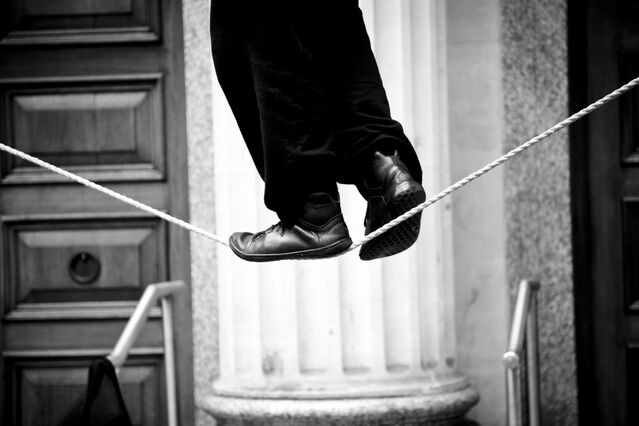Fear
If You Can Do This, You Can Do Anything
A symbolic risk can give you the courage to take on bigger challenges.
Posted June 24, 2021 Reviewed by Kaja Perina
Key points
- A symbolic risk—a firewalking workshop, pilgrimage, ropes course, solo journey, vision quest—can give you the courage to take on any challenge.
- Symbolic risks aren't directly related to your callings—say quitting your job to start a new company—but are related to the courage they require.
- A symbolic risk helps when preparation to follow a calling devolves into procrastination, since studying a call can be a good way of avoiding it.

One spring morning in my late 20’s, I found myself sitting in the back of a six-person raft on the Gauley River deep in a gorge in West Virginia, gripping my paddle with white-knuckled fingers as we rounded a bend and heard the thundering roar of a rapids known as Pure Screaming Hell. The Gauley has the highest class whitewater that a commercial outfitter is legally allowed to take people on, Class-V.
Above the din, our guide yelled out that if we wanted to walk around it, now was the time, because in another 30 yards there’d be no stopping. At 20 yards, my thighs and stomach trembling, my attention fixed on “Hell” approaching fast dead-ahead, I thought about why I was there at all.
Though the ostensible reason was simply adventure, the deeper reason had something to do with the conversation I had with a friend who’d recently returned from one of those fire-walking workshops whose sole purpose is to convince you that if you can do this you can do anything.
Let's say you're facing the need to act on a calling or pursue a passion, or just step more fully up to the plate in your career or relationships, make the kind of change that will redirect and revitalize your life.
And let's say you've reached a point when you've done all the innerwork you can, all the discernment and armchair ruminating. You've analyzed every facet of it, probed every consequence of following it, not following it, procrastinating in following it, jumping on it right away, or trading it in for another. You've pondered whether it’s really yours or you’re appropriating someone else’s, whether the time is now or later, whether it’s being murmured to you by God or not-God. You've rehearsed all your new affirmations, rounded up the support of friends and family, worked to psyche yourself up for the challenge, perhaps even taken smaller risks to practice your daring. But you're still not actually following the call, and in fact are beginning to feel like you're studying it to death, which is a great way of avoiding it.
The fact is, practice can easily devolve into procrastination. There's no end to the rehearsals you can make, the questions you can pose, the experts you can consult, and the classes you can take. At some point, you just have to leap. But you're not doing it.
Here's where a symbolic risk might come in handy. Not one directly related to the call itself—say quitting your job to start a new company, or putting together an album to kickstart your singing career—but one related to the act of courage it will require of you, “an almost physical nerve,” the writer Margaret Atwood calls it, “the kind you need to walk a log across a river.”
This symbolic risk (which doesn't mean it isn't also a real risk) could be a firewalking workshop, vision quest, personal growth seminar, pilgrimage, ropes course, solo journey, or physical challenge like mountain-climbing, skydiving, or Class-V whitewater rafting. And by submitting yourself to this sort of challenge, you can gain courage that will carry over into whatever greater challenges you want to tackle in your life—a leap of faith, the pursuit of a calling, a life-change that will redefine who you are. It will give you a booster-shot of the strength and confidence you'll need to address whatever is holding you back. And you'll give yourself a boots-on-the-ground experience of confronting and moving through fear.
I once sat in on a weekend trapeze class that was designed, like the fire-walking workshop my friend had attended, largely as a fear-fighting tool. On the last day I overheard a participant say to one of her classmates, “Well, I’ll be fearless for a week.”
Which would, of course, be precisely the week to take some long-needed leap of faith.
At ten yards, the water around the raft began to bellow, I began to hyperventilate, and boulders loomed up on both sides, blocking any chance for exit. I turned around and saw the guide crouching in the back, screaming for us to paddle hard right, hard right, harder, harder! Then his voice was completely drowned out.
The river dropped out from under us, and we dropped with it, suspended for an alarming moment in mid-air above a swirling hole eight feet deep, only the back end of the raft even touching water at all. And then everything became a chaos of bodies and supplies slamming against each other, oars being ripped out of our hands, and the raft buckling in two like the sides of a board game. Two men spilled out into the boiling water, their faces a still-life of fright.
Suddenly I heard the guide’s voice from somewhere above and behind me: “Forward, forward! Paddle forward hard, hard! Don’t let it suck us back in.” Behind me was a wall of dark green water veined with coils of white foam, and a fuming trough between it and us, where the water was turning back on itself as it poured over an enormous boulder. Earlier in the day the guide referred to these troughs as sleepers. “You get caught in one of those,” he had said, “and that’s where you’re gonna sleep.”
By now, only four of us out of six were left in the raft, all paddling wildly in our attempt to climb out of that hole, the river shouting obscenities in our ears, the guide trying to shout over the river, “Hard, harder!” A second later, we slipped over the edge of hell and into hell’s outwash, paddling fiercely to catch up with our overboard crewmen.
A few days later I returned home wearing the coveted “I survived the Gauley” T-shirt, feeling that if I could do that, I could do anything. Until I got back to work, however, I didn’t understand the real reason I had gone.
“So, you’ve conquered the Gauley,” a colleague and fellow river-rafter exclaimed, clapping me on the back. “What do you do for an encore?”
“Quit my job!” I said.




